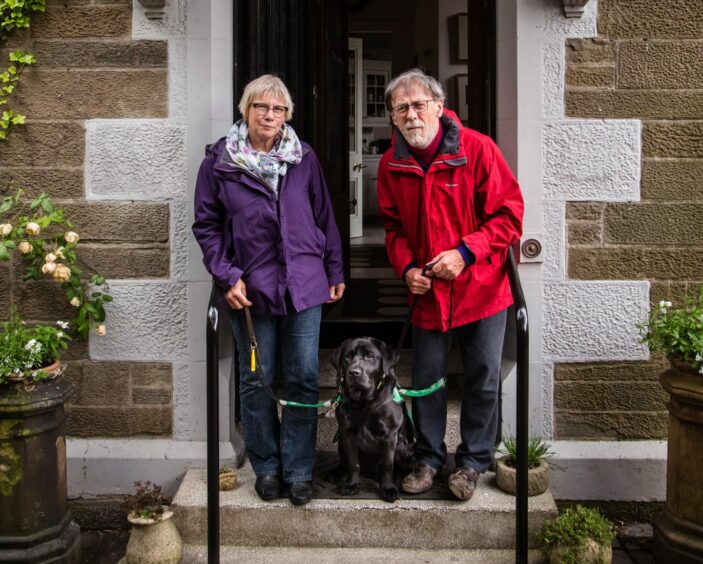Dementia is an umbrella term for conditions which result in loss of memory, language, problem-solving and other mental abilities.
There are many medical illnesses which can cause dementia, including Alzheimer’s disease, which accounts for 60-80% of dementia cases.
Such conditions create abnormal brain changes which are severe enough to interfere with everyday life, affecting cognitive abilities, behaviour, feelings and relationships.
What is a dementia assistance dog?
Dementia assistance dogs can help people suffering with the condition. They will be assigned to a family for the duration of the dog’s life and will live in the family home.
These dogs are trained to the highest standard by Dogs For Good, on behalf of Alzheimer Scotland, as part of a unique collaboration project only in Scotland.
The dogs can respond to alarms to get patients to rehydrate, take medication, get out of bed in the morning and much more.
Once placed with families, their training will be individually tailored to suit the person with dementia, taking into account their needs and personal family set-up.
The dogs are all selected for their affectionate and calming nature and are trained in methods to reduce anxiety, such as placing their head on to their owner’s knees.
Early training
A dementia assistance dog’s training starts from the age of 14 weeks, when the pup receives ‘early training’ at Dogs For Good’s HQ in Banbury, Oxfordshire.
There they learn how to behave in different environments, such as shops, cafes, out in the open, and start to build on their social skills.
After 16 weeks trainers will have identified which dogs will be selected as dementia assistance dogs, due to their characteristics.
Dog instructor Kerry Gough, specialises in training dementia assistance dogs at Dogs For Good.
She said: “For a dog to be chosen as a dementia assistance dog, it has to be very sociable with people, polite on the lead, have good greeting skills, be good with other dogs and not easily distracted.
“It has to be a well rounded dog and able to manage different environments and go to different places.”
Dogs will also be selected for other roles, such as assistance dogs for adults or children with physical disabilities, autism, or community dog programmes.
Advanced training
After 16 weeks of early training and role identification, the dementia assistance dogs are ready to begin their advanced training, at HMP Castle Huntly, in Longforgan.
Prisoners who have already completed a separate basic dog training course – through a separate organisation Paws For Progress – help with the training.
Here the dogs learn to walk on a dual lead, where two leads are attached to the dog, one for the person with dementia and another for their carer.
The dogs are also taught to ‘anchor’, where they will sit and stay next to their owner, which encourages people with dementia to stay sitting down too.
They learn to carry out specific tasks in response to a pre-set alarm, such as collect and deliver a medication bag or water bottle.
And they are taught pulling techniques to help with undressing or opening doors, fetching skills and many more useful tasks.
Where did the idea come from?
The original concept of dementia assistance dogs started in 2011 with a group of design students from the Glasgow School of Art.
These students were commissioned by Alzheimer Scotland to create new design concepts that could help people to live well with dementia.
This concept became a world-first pilot, forming the Dementia Dog project, a charitable collaboration between Alzheimer Scotland and Dogs for Good.
How can I get a dementia assistance dog?
Training these dogs is extremely expensive, due to the intensity and level of training needed – around £21,000 per pup.
Given the project is run by two charities, funding grants are required to cover the cost of training dementia assistance dogs.
This has resulted in only 11 dogs in the country receiving training – all of which have been placed with families in Scotland.
Applications for further grants are in process, however demand is extremely high.
Find more information on the Dementia Dog project here.
If you have a pet dog and are interested in supporting Alzheimer Scotland’s community-based therapeutic programs involving pet dogs, visit the charity’s website for more information.












